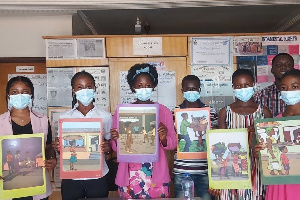 Representatives of Girls and Young Women (GYW)
Representatives of Girls and Young Women (GYW)
Representatives of Girls and Young Women (GYW) groups in the Kumasi Metropolis and the Asokore Mampong Municipality, have called for stiffer punishment for perpetrators of child labour to serve as a deterrent to others.
They were of the view that people continued to engage in the act because sanctions for offenders were a bit lenient and called on authorities to do more to protect children from abuse.
The groups that comprised mainly female adolescents from Junior High Schools (JHS) raised the concerns at this year’s World Day Against Child Labour organized by the Defence for Children International (DCI), Ghana Section in Kumasi.
This year’s celebration was on the theme “Act Now, End Child Labour”.
Participants were drawn from Buobai M/A JHS, Asokore Mampong M/A JHS A, Buokrom M/A JHS, Atonsu M/A JHS.
They described child labour as mentally, morally, socially and physically harmful to the well-being of the child and appealed to stakeholders in child welfare to step up efforts to promote child welfare and development.
Issues concerning children are special and awareness creation and education was vital to alleviating child labour and other related issues, the group observed.
Other concerns raised by the participants were the need to make education compulsory for all school-going age children and the creation of employment avenues for the teeming unemployed youth to reduce the surge in recent criminal cases.
Ms Joana Anokyewaa, Programme Manageress for DCI-Ghana, said the organization was intensifying advocacy and education in the areas of child labour, girls and women empowerment for societal groups and individuals to rethink their decisions on child labour issues.
It was part of the DCI’s SHE Leads project which prioritized girls and young women inclusion in decision and policy-making at all levels.
She said the inclusion of girls in decision-making, especially in the homes, was very important, adding that the majority of child labour issues started from the homes.